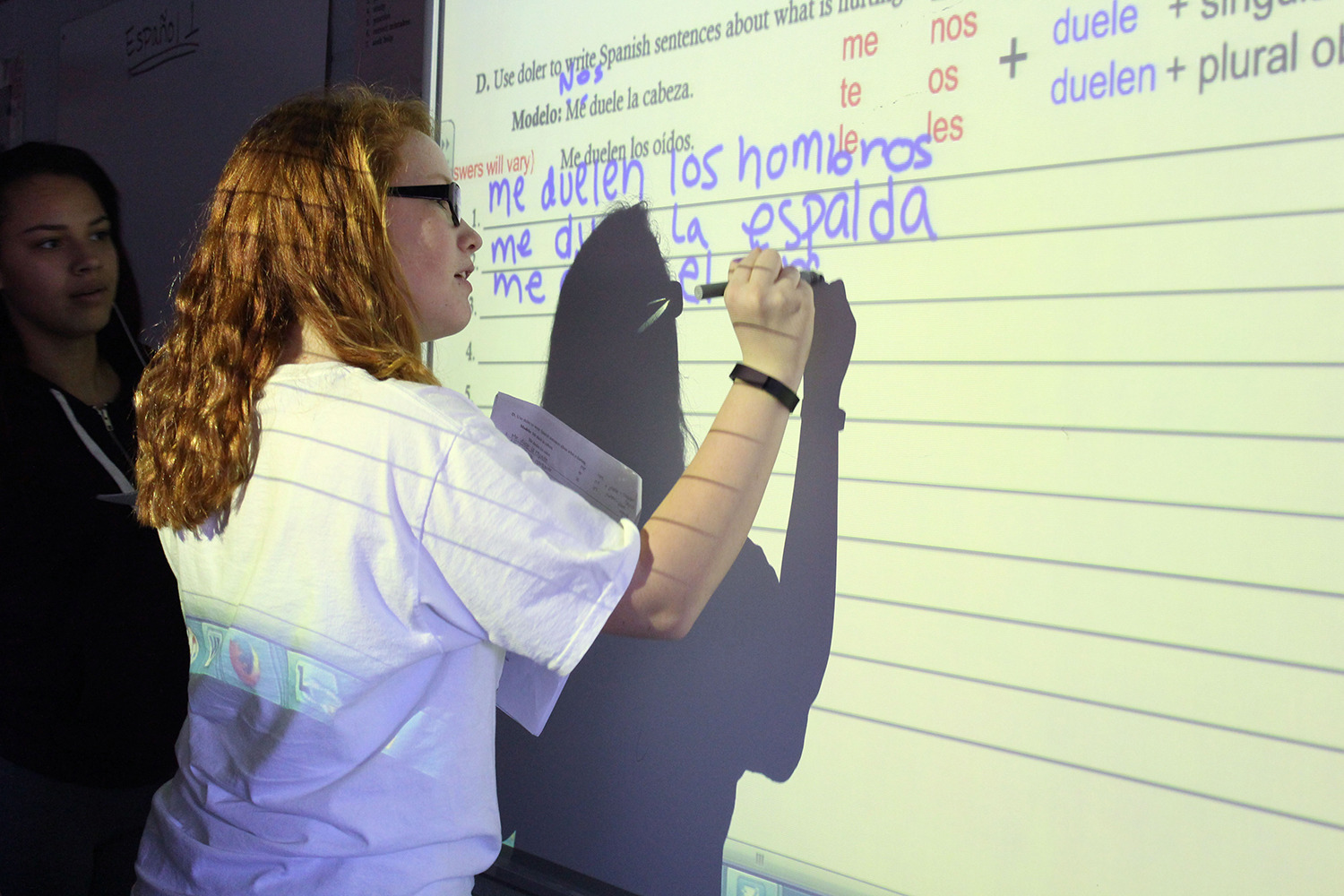The United States has a Language Learning Deficit
Credit to Riley McCrackin
Freshman Elizabeth Cox writes a sentence in Spanish on the Smart Board while in Anelise Mossinghoff’s fifth hour Spanish I class.
Published: April 21, 2017
At FHN we offer four foreign languages with numerous other languages online. It is also recommended that students take two years of foreign language for college. So why do we put an emphasis on learning the basics of a language? It is proven that professionals who speak multiple languages are more marketable to employers. However, the public school system of language learning sometimes cannot accomplish fluency itself. The easiest, although sometimes frustrating, way to become fluent is through immersing yourself in a language.
Learning a language not only makes you more marketable to future employers, but it also helps to expand your horizons. During the process of learning a language, you are then able to communicate with a portion of the world that you were not able to before. Sure there are alternatives, such as translators and software, but imagine a game of telephone. As the message is passed through multiple parties, things get lost in translation. To be able to unlock these new worlds, we must strive to learn more languages and circumnavigate the barriers.
The U.S. is lagging in their education of foreign languages. It is not compulsory to learn a foreign language in the U.S., whereas various countries in Europe require all of their students to learn two languages. Europe is unique in each country is only a few hours from a different language and culture. Thus, this strong emphasis on language learning is placed because those countries encourage cooperation and diffusion of ideas. In the U.S., we offer such classes, but do not place as much emphasis as we should.
I have been in Spanish since eighth grade, and I am in Spanish V, yet I still could barely hold a conversation with a first grader in the language without outside learning that I have done. It has been a goal of mine to learn as many languages as possible within my lifetime, and to do this there is one way that I feel that is the best way to learn: immersion.
For a person to immerse themselves in a language means to travel to an area that speaks a foreign language and then for that person to start to interact normally with people. This year Spanish, German, French and Chinese classes from FHN are going on trips to immerse themselves in their respective languages and cultures.
German classes are going to Germany, Spanish classes are traveling to Ecuador, France is going to France and Chinese is going to China. The Ecuador trip will be focused on exploring the South American culture and service. The Spanish students will be joined by the Spanish classes from FHC. The German, French and Chinese trips will be focused on taking in their cultures and languages. Through these class’ experiences, the students will benefit immensely through cultural intake and language immersion.
These trips were the initiative of active students and passionate teachers. However, these experiences and language learning is decreasing in prevalence. As our district continues to deliberate on class cuts for next year, some language classes feel the hardest decline in enrollment. The passion for learning languages is not as high as it should be, and a way to increase that is by continuing to engage students in international experiences. In the future, more opportunities for language and cultural immersion should continue to be available so that students at FHN can procure new cultures and new worlds.







![FHN Holds Prom at Old Hickory Country Club [Photo Gallery]](https://FHNtoday.com/wp-content/uploads/2024/04/Brewer_stopmotion-9-300x200.jpg)
![FHN Boys Varsity Volleyball Team Goes Against Troy [Photo Gallery]](https://FHNtoday.com/wp-content/uploads/2024/03/IMG_7545-300x200.jpg)
![FHN Students Watch the Solar Eclipse [Photo Gallery]](https://FHNtoday.com/wp-content/uploads/2024/04/4.8.24-solar-eclipse_-300x200.jpg)
